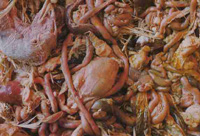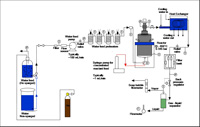Production of petroleum substitutes from turkey waste by conversion in subcritical water
Researchers: Andrew Peterson, Russ Lachance
Principal Investigator: Professor Jefferson Tester
External Collaborator: KC Swallow (Merrimack College).
 Hydrothermal processes can be used to convert waste biomass into fuels and other by-products, and one such process is being implemented commercially by Changing World Technologies. In their process, turkey waste is converted into gasoline and diesel splits, carbon black, and amino-acid fertilizers. In the hydrothermal conversion, a reaction is thought to occur between carbohydrates and amino acids, called the Maillard reaction, which creates brown nitrogenous polymers. These polymers complicate the separation of the aqueous and lipophilic phases at the end of the hydrothermal conversion step.
Hydrothermal processes can be used to convert waste biomass into fuels and other by-products, and one such process is being implemented commercially by Changing World Technologies. In their process, turkey waste is converted into gasoline and diesel splits, carbon black, and amino-acid fertilizers. In the hydrothermal conversion, a reaction is thought to occur between carbohydrates and amino acids, called the Maillard reaction, which creates brown nitrogenous polymers. These polymers complicate the separation of the aqueous and lipophilic phases at the end of the hydrothermal conversion step.
 The objective of this study is to examine the reaction kinetics of a model system of a carbohydrate and amino acid in order to better understand the Maillard reaction under these high-temperature and pressure aqueous conditions. Glucose and glycine have been chosen as the model carbohydrate and amino acid.
The objective of this study is to examine the reaction kinetics of a model system of a carbohydrate and amino acid in order to better understand the Maillard reaction under these high-temperature and pressure aqueous conditions. Glucose and glycine have been chosen as the model carbohydrate and amino acid.
A small continuous stirred-tank reactor (CSTR) has been used to study the reactions of these two systems. Reactant concentrations in the range of 100-2000 ppm have been explored. Residence times primarily in the range of 4-12 minutes have been studied. Most experiments have been performed at 250oC and 800 psig, in subcritical liquid water. Experiments have been run at pH 2 and pH 5; pH adjustments have been made with sulfuric acid.
Related links:- Changing World Technologies
- An article from National Geographic on Changing World Technologies
- Life-Cycle Assessment of this process at MIT